This afternoon I came to a few sentences I’d typed in my phone notes about one of my favourite films, and somehow ended up travelling two years back in time to the Russian Arctic, December 2021, and producing several thousand words.
So settle into your seats — ideally on a train — and come with me on a journey to the edge of the earth…
April 6th, 2024
Rarely has a film made me feel so seen or understood, or moved me so deeply, as Juho Kuosmanen’s Compartment No. 6 (2021). I think, unfortunately for everyone I recommend it to, it might be a bit too specific to me to strike a chord with other people in quite the same way. But maybe this piece will intrigue you enough to find out.
Set in the spring of 1998 (an era the director describes as ‘Russia’s hopeful moment’), Compartment No. 6 begins in Moscow. Laura is a lonely Finnish archaeology student, studying abroad in Russia and living through the last moments of a failing relationship with her older female professor Irina (no I did not write the script). Abandoned by Irina, who was supposed to accompany her, she embarks on the immensely long train journey from Moscow to Murmansk, where she intends to see the renowned petroglyphs. Settling into her compartment, she finds herself face-to-face with Ljoha, a young, drunk, macho Russian guy who immediately begins to sexually harass her. This, surprisingly, does not turn out to be as awful a predicament as you’d imagine it might be.
Armed with a camcorder and a no-nonsense attitude (two things I also picked up in Russia), Laura negotiates the complexities of living alongside Ljoha throughout their epic journey and begins to break through his self-protective walls, discovering genuine kindness. They fall into an offbeat romance which awkwardly treads the boundaries between platonic and romantic, ultimately eluding definition but rather celebrating the gentleness and warmth of human connection.
I think my friend and flatmate Dom had watched Compartment No. 6 in various St. Petersburg cinemas about three times by the time we actually made our journey to Murmansk. Actually, I think that might be the entire reason we ended up there. But my other flatmate Charlotte and I, tragically without Covid passes to get into the cinema, were none the wiser.
A few days ago, Dom came over for one last London dinner before leaving for Paris. We talked for hours, but eventually came back to the thing we can never stop ourselves from returning to: the four days when we travelled to the Russian Arctic. It was over two years ago now, but somehow remains one of the most tangible memories I have. I ended up reading Dom my diary entries from those four days, written on the train journeys between St. Petersburg and Murmansk.
The town of Murmansk was founded in 1915 as a supply port in World War I. In World War II it served as the main port for Anglo-American convoys carrying war supplies to the USSR across the Arctic Ocean. In 1941 German forces in Finnish territory launched an offensive against the city, and Murmansk suffered extensive destruction — rivalled only by that of Leningrad and Stalingrad. The Luftwaffe bombed the city 792 times during WWII. In 1985, to commemorate its resistance, it was formally named a Hero City. During the Cold War, it was the centre of Soviet submarine and icebreaker activity.
The economy of the town suffered significantly following the collapse of the Soviet Union, as its major industries became unprofitable and most fishing vessels were contracted out to foreign companies. As a result, its population dropped by more than one-fourth in the 1990s.
Now, Murmansk is the largest city in the world north of the Arctic Circle. Its name probably derives from the local Sami word murman, meaning ‘the edge of the earth’.
December 18th, 2021
I’m writing this at the table of our strange AirBnb in Murmansk while Dom and Charlotte nap. I’m in front of the window, looking out over a huge, eerie courtyard with a Magnit, an incredible number of bins, and the McDonalds' workers’ smoking area. It’s the northernmost McDonalds in the world.
We took a 24-hour train here, from the night of the 16th until last night, and it was a surprisingly wonderful experience. I hardly felt claustrophobic, even though we spent so long in such a tiny space (compartment no. 14), probably because we were travelling past such beautiful scenery all the time: lakes and forests and tumbledown cabins with smoke billowing from the chimneys, everything covered in snow. I slept on the top bunk, and the rhythm of the train was so soothing — like a heartbeat, as Anna promised it would be in our class on Wednesday.
Dom embroidered by the light of an orange peel (which he ingeniously placed over the bright white lamp), and we talked for hours and listened to Voyage Voyage by Desireless on repeat (to the point that our compartment neighbours knocked on the wall to tell us to shut up). We made friends with the conductor, Ivan, and the family down the hall, whose children kept running up and down and sticking their heads into our compartment. The father came to speak to us at some point and was so friendly. We later realised that was because he wanted his toddler to sleep in our fourth bed. At this point we feigned incomprehension.
St. Petersburg has had a bad atmosphere recently. Partly because of [redacted], partly because all of the snow has melted into muddy sludge with lethal ice underneath it, and partly because of the lingering presence of death. Last week an icicle fell on a woman on Gorokhovaya and now she’s in a coma. A man and a woman in their twenties were hit by a drunk driver on Nevsky, at the crossing right next to the Irish pub which Charlotte always goes to, and the woman died. A homeless person died in the paradnaya of the boy’s flat, the one opposite the army base, which I discovered from a police notice on the door a few days after it happened. Apart from Yana’s existence, it was not feeling good to be there, and I’m glad to have escaped for a while.
The train journey felt like therapy: no internet, no smoking except for one long stop (where Charlotte and I bundled up and ventured out into the snow with all the old men), and so much time to sit and contemplate things. Now life in St. Petersburg feels extremely far away and almost unreal, but also like the only thing I’ve ever known.
This is the furthest north I’ve ever been, and maybe ever will go. It’s utterly surreal to zoom out on the map and look at where we are in relation to everything. Right now in the Arctic there are only three hours of daylight per day — we’re in the period called the ‘polar night’. Even during those three hours you feel like you are seeing everything through a layer of dust. Everything is sort of hazy. Or maybe it’s my malnourished vision, I don’t know. Tourists usually come here to see the Northern Lights. We probably won’t — the weather isn’t favourable.
We woke up early this morning and embarked on what ended up being a freezing, treacherous 14km walk up hills through the snow. At one point a woman came up to me in the street and told me to braid my hair and put it inside my coat or it would snap off. We saw a lighthouse, a memorial for a submarine accident, a vast frozen lake, a statue of a cat made famous by urban legend, an abandoned Soviet cinema, and finally the deserted Murmansk Regional Art Museum, where about seven babushkas ganged up on us about our tickets and sent us running up and down the stairs several times. I think they had definitely just decided to conspire against us for something to do.
At about midday we came across a small church on a hill — the Church of the Savior-on-Waters. Inside it was foggy with incense and warmth, water condensing on the turquoise walls which were barely visible for all the icons. An Orthodox baptism was being performed. We skulked, waiting for the child to be immersed, but the chants seemed to go on forever. Candles blazed and old women swept up melted snow around us. My skin became wet to the touch.
On another hill, at the highest point above the city, we finally found Alyosha the soldier — a memorial to ‘the Defenders of the Soviet Arctic during the Great Patriotic War’. His helmeted head had been on the horizon all day, but I hadn’t realised how imposing he would be until we were standing at his feet. 139ft tall, the second tallest statue in Russia, after The Motherland Calls in Volgograd. He stood with his gun, his back to us, facing into the sky. The footsteps in the snow leading up to the pedestal looked as though they were made by him. He seemed somehow too vast and monolithic to be inanimate.
As dusk was falling, we saw children coming home from school. They flooded in and out of the doors of the Ice Palace, hair braided, rhythmic gymnastics hoops in mittened hands. Teenagers kissed and fought in the middle of the street.
December 20th, 2021
Yesterday in Teriberka feels utterly dreamlike, as though it never happened. I’m writing this on the train at 11am, at the beginning of another 24-hour journey, this time back to St. Petersburg. Our conductor is also called Ivan, but a different one, much more unfriendly — actually very aggressive. We’re sitting in silence listening to Luftauftakt, music we discovered the first time we went to Ugly, which sounds like what it feels like to walk through an empty, snowy forest. My hands are shaking so much from the movement of the train and all of the caffeine in my veins.
Teriberka is an almost abandoned village on the coast to the north, on the Kola Peninsula, with a population of just under 1000 people. You can only reach it by car — there is no public transport. The three of us had the delusional idea that we would get a taxi there in the morning, explore alone, and then get another one back at night. I think if we had actually done that we would have probably died. Our driver, Ivan, laughed out loud when we suggested it and told us that he’d stay with us all day — a thought that made us feel safer until we experienced his driving. I have never, ever experienced a car journey like that and hope I never will again. He was driving 130km/h down ice roads through a barren wasteland, heavy bass blaring the entire time, the only signs of humanity being the occasional bent-over road sign. Dom was sitting in the front and Ivan kept trying to use Yandex Translate to talk to him, taking both his hands off the wheel to type into his phone. He kept reassuring us that he does the drive almost every day, so we were in safe hands. After we’d been driving for about an hour and hadn’t seen a single soul, his girlfriend suddenly passed in a car going the other way. He briefly held her hand through the open window and then we drove on.
It was still pitch dark when we left, and only got marginally lighter. We stopped for a smoke at some point and the sky was a deep, bright blue, with a huge full moon hovering over the horizon. My eyes were weeping from the cold and the tears immediately froze. I felt extremely dizzy, awake and alive.
Teriberka was even more desolate than I expected, maybe because it was spread out across a bridge. There were various viewpoints, a boat graveyard, a whale skeleton, a derelict school (built in the 1940s, abandoned in 2005), a beach with frozen sand, and mountains in the distance. Ivan drove us to each of them, stopping to let us out for about 20 minutes at a time. There were huge distances between each place. I lost all of the strength in my right hands and I couldn’t move my toes. My phone died as soon as I exposed it to the air, and the shutter of my camera lagged for 15 minutes. I was in a daze the whole time, absorbing everything but barely able to engage.
The floor of the school was covered in books, carpeted in loose pages. There were still dried flowers pinned up in one classroom. Poetry scrawled all over the walls. «До встречи в прекрасной России будущего» (“See you in the beautiful Russia of the future”) written carefully across the panel of a door. A peeling mural of a conspiratorial wolf and fox, Soviet fairytale style. Most of the windows were smashed and looked out onto the mountains in the distance (and Ivan trying to dig his car out of the snow).
It felt as if the building had been absorbing the cold for years — the inside was colder than the outside. There was a gym in the basement and the basketball hoops and ladders were still there, underground in the dark. It was strange to think about how many children’s hands must have touched the rungs of those ladders over the years.
After the taxi had been towed out of knee-deep snow by a man in a Jeep, Ivan drove us through a canyon in the mountains, to a beach where the black sand was rock hard, and there were tiny rivers running down to the sea. At the next viewpoint, standing next to a wooden whale tail, we could look down on where we had just been.
The boat graveyard was so surreal — so many broken ships disintegrating into the water — and it was only after we had been standing there for a while that I realised we were standing in the skeleton hull of a ship that had been filled with snow.
Parts of one of my favourite Russian films, Leviafan (2014, dir. Andrei Zvyagintsev), were filmed on the Kola Peninsula. I wrote one of my second-year dissertations about it. The quote I was given to discuss was: ‘The world of human feelings and the world of nature in post-Stalinist film reveal their kinship; man turns out to be less a social creature than a natural being’ (Evgenii Margolit).
I chose to write about three of Zvyagintsev’s films: Vozvrashcheniye (2003), Leviafan (2014), and Nelyubov (2017). The research process involved watching all three films over and over, immersing myself in their worlds. I sometimes think that it’s no wonder that I spiralled in second year — the first time I watched Nelyubov, in the cinema when I was still at school, my best friend and I gripped each other’s hands so hard they bruised. That is to say, they’re not easy to watch.
In Leviafan [...] the natural world is a powerful force that is predominantly used to reveal the faultlines in a profoundly fractured society. Whether the films focus on dysfunctional families, broken relationships, governmental corruption or all three, the bleakness of their landscapes intensifies the impact of the brutal social commentary concerning human connection, loneliness, and alienation. Disconnection and psychological isolation are shown to be exacerbated by alcoholism and the presence of modern technology and social media, but ultimately, it is the omnipresent natural world which draws attention to the human condition, as ‘the human world, devoid of grace and salvation, enters into dialogue with its non-human other.’1
All of Zvyagintsev’s films revolve around family dramas. Standing at that viewpoint in Teriberka looking out over the Arctic landscape, I had the sense that somehow, in a dream, I had been inside one of those tiny, shuttered-up houses; that I had, maybe, some inkling of how their inhabitants lived. Or maybe I had no idea at all.
The seaside village in Leviafan is [...] populated by reminders of death and the passage of time: a beached whale skeleton, a gutted church, and the bare bones of boats which have run aground. These remains ‘suggest a far-reaching process of disintegration of human civilization: an externalized sign of inner decay.’2
Our final stop was maybe the strangest for me, even though it was the closest to civilisation. We pulled over on the side of the road by what claimed to be the northernmost restaurant in the world, and when we got out of the car I immediately saw the skeleton of a house on stilts that I recognised. Anastasia had taken a photo of it when she went to the Arctic one summer, and it was my desktop screensaver for a whole year, so I saw it constantly. It’s one of my favourite photographs ever, and suddenly, entirely unexpectedly, it was in front of me in real life, emerging from the water.
Ivan drove us back to Murmansk (more heavy bass and skidding), and we collapsed into bed. I couldn’t sleep, so I just sat in the dark looking out of the window. When the other two woke up we went to see Lenin, the nuclear icebreaker ship, in a snow blizzard. Huge ships like that freak me out so much. I can’t stand thinking about the shape of the hull under the water.
I don’t feel exactly sad to have left Murmansk, but it is really strange to think that I may never go back there, or if I did, it would be years from now, and everything would be different. I know that it will be a place that I never stop thinking about. It was so removed from the normal passage of time. It felt like stepping outside of reality.
My head feels full of images, broken up and removed from any kind of narrative. A week or so ago I was in Alexander Nevsky monastery. One of the candles in the sand tray had melted so it was folded in half and drops of burning wax were falling to the floor, so that fire was hitting the tiles and instantly extinguishing itself, over and over again. It was really mesmerising, so I was standing there watching it, and suddenly an old woman who had been devoutly crossing herself rushed over and grabbed the entire candle in her fist, still burning, and crushed it into pieces.
April 6th, 2024
These days, I feel a physical ache in my chest whenever I think about Teriberka and its strange loneliness; about the children of Murmansk pouring out of the doors of the Ice Palace in the half dark, and the teenagers kissing against the wall of the McDonalds in -40 degrees. I wonder idly, without much hope, how the inhabitants of the so-called Hero City, which has known the tragedies of war, perceive their country’s actions in Ukraine.
I think of the profound warmth and empathy which emerges in Compartment No. 6, and the isolation and cruelty which crystallises in Leviafan. All of these things made up my experience living in Russia.
I think of how I spent four years of my life trying to get closer to an understanding of the Russian mentality; how at times I felt like it was within reach. When the war started and I left Russia, that aspiration had to be crushed. Or rather it receded; became an impossibility that I had to deal with.
Vassilieva, Julia. “Russian Leviathan: Power, Landscape, Memory.” Film Criticism, vol. 42, Issue 1, 2018.
Hristova, Maria. “Corruption as Shared Culpability: Religion, Family, and Society in Andrey Zvyagintsev's Leviathan.” The Journal of Religion and Film, vol. 24, no. 2, 2020.

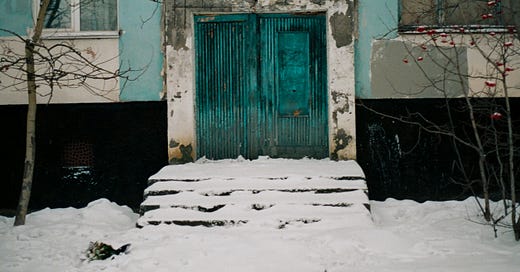


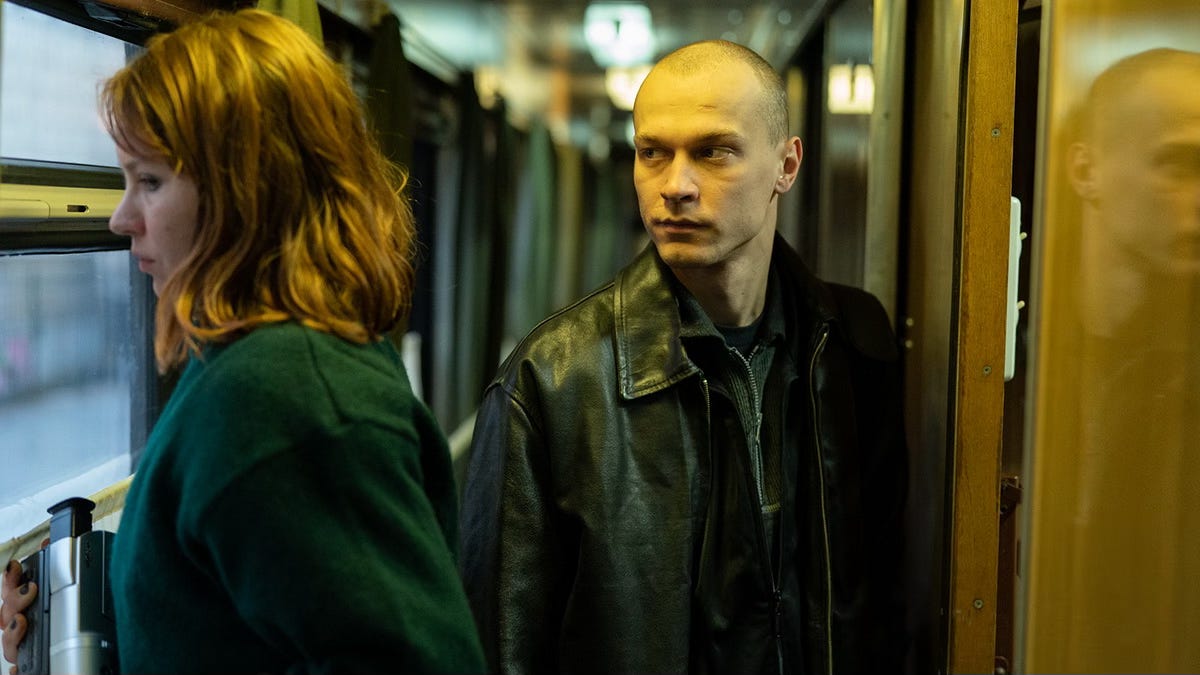
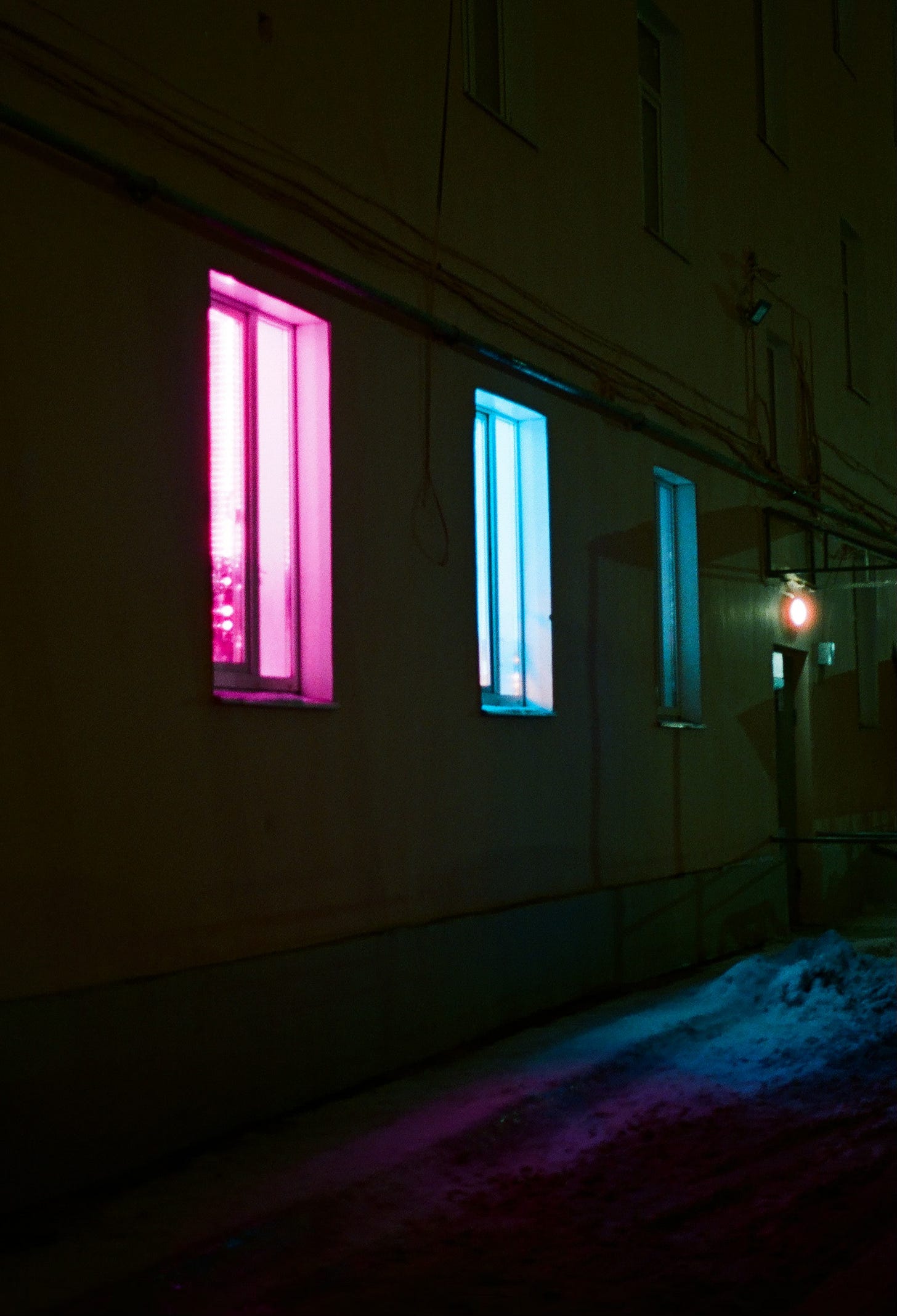
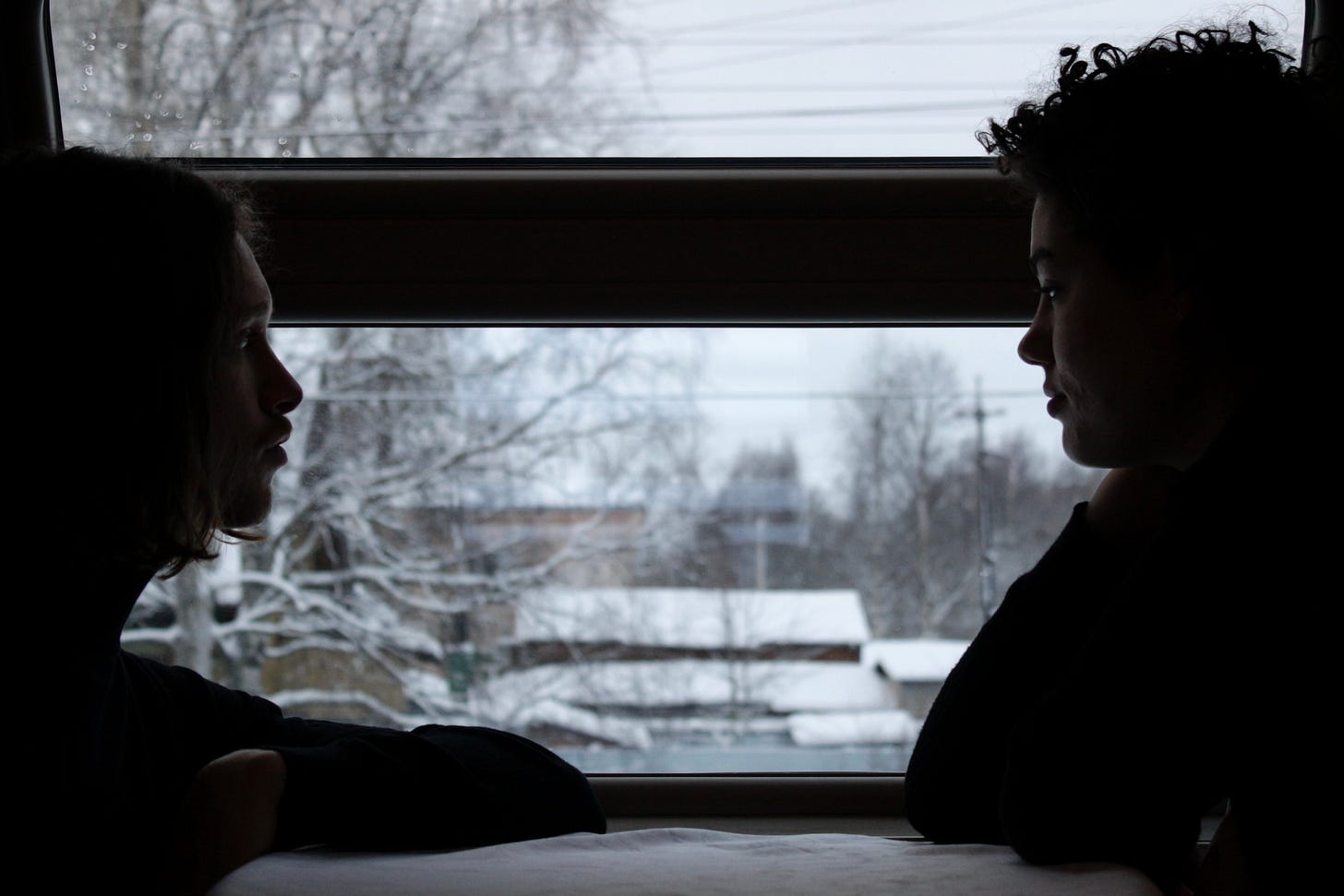
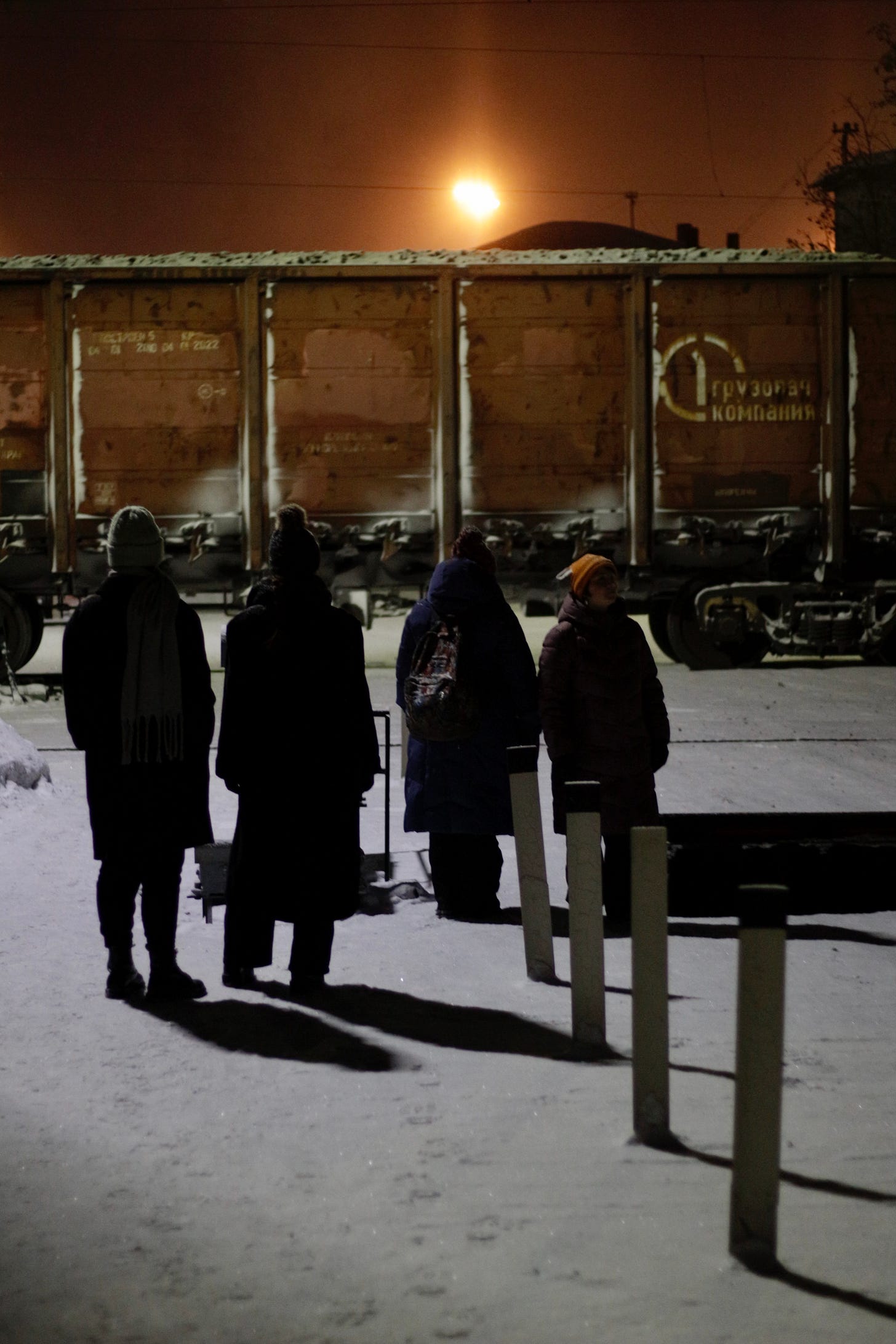
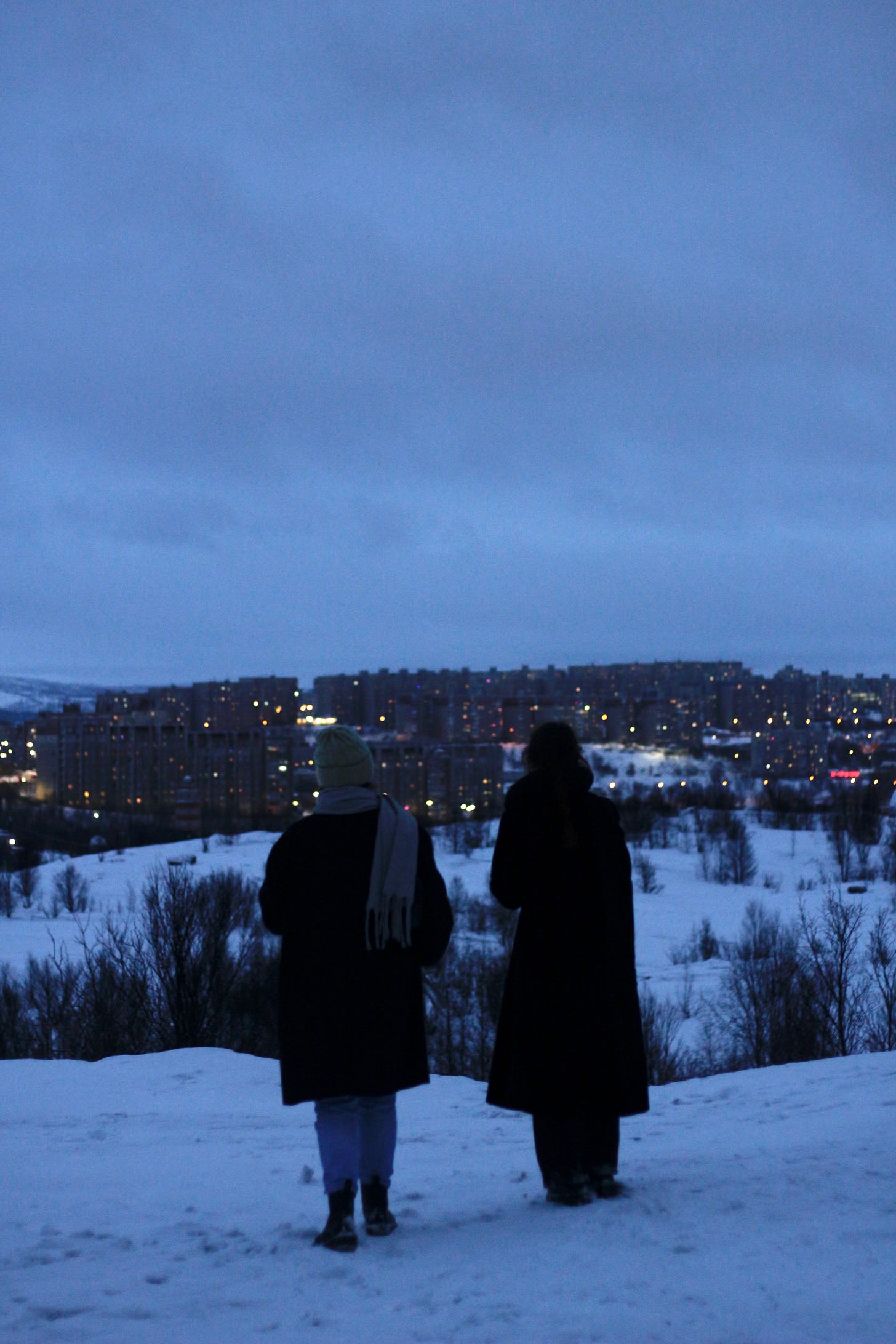

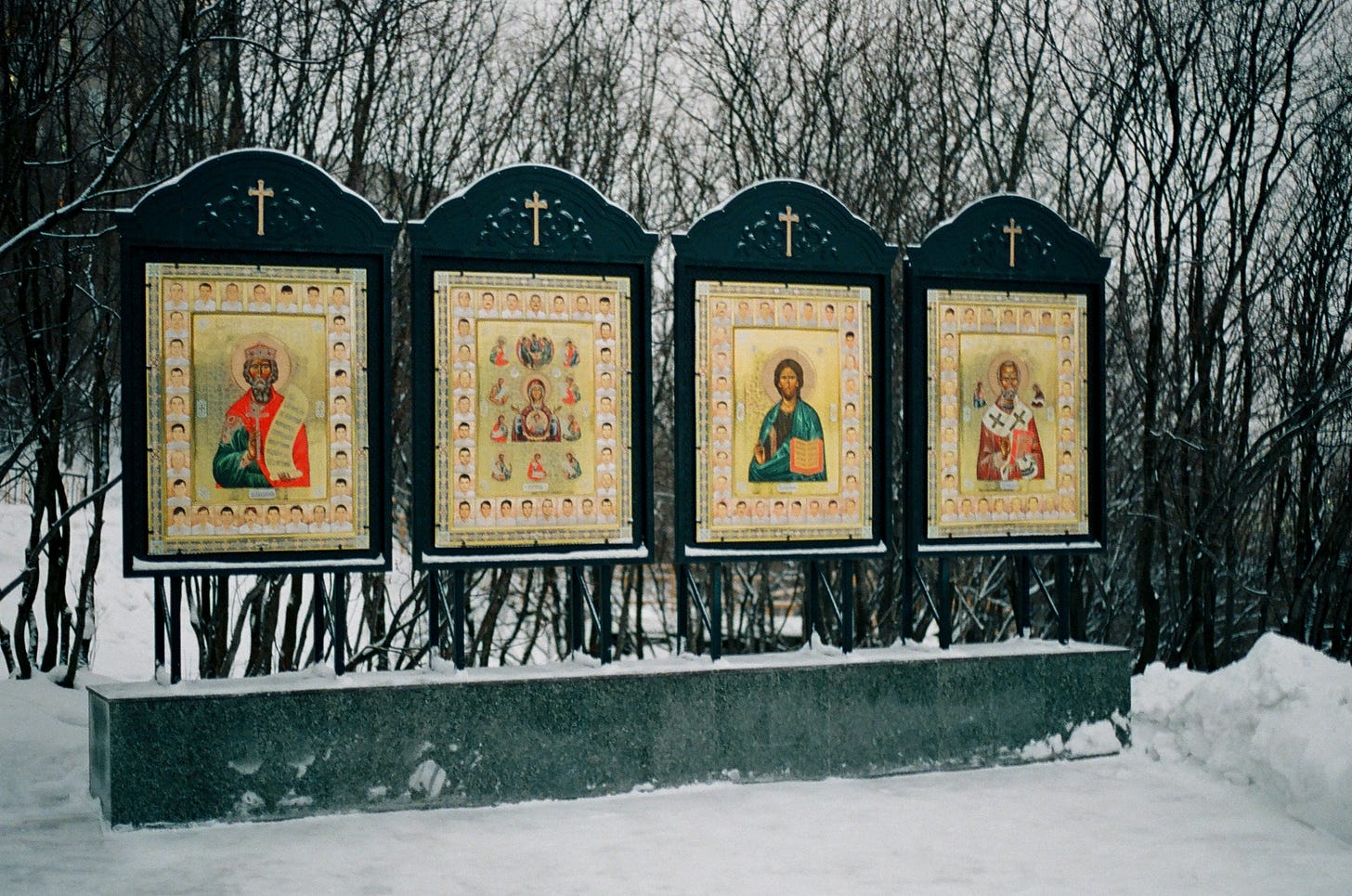
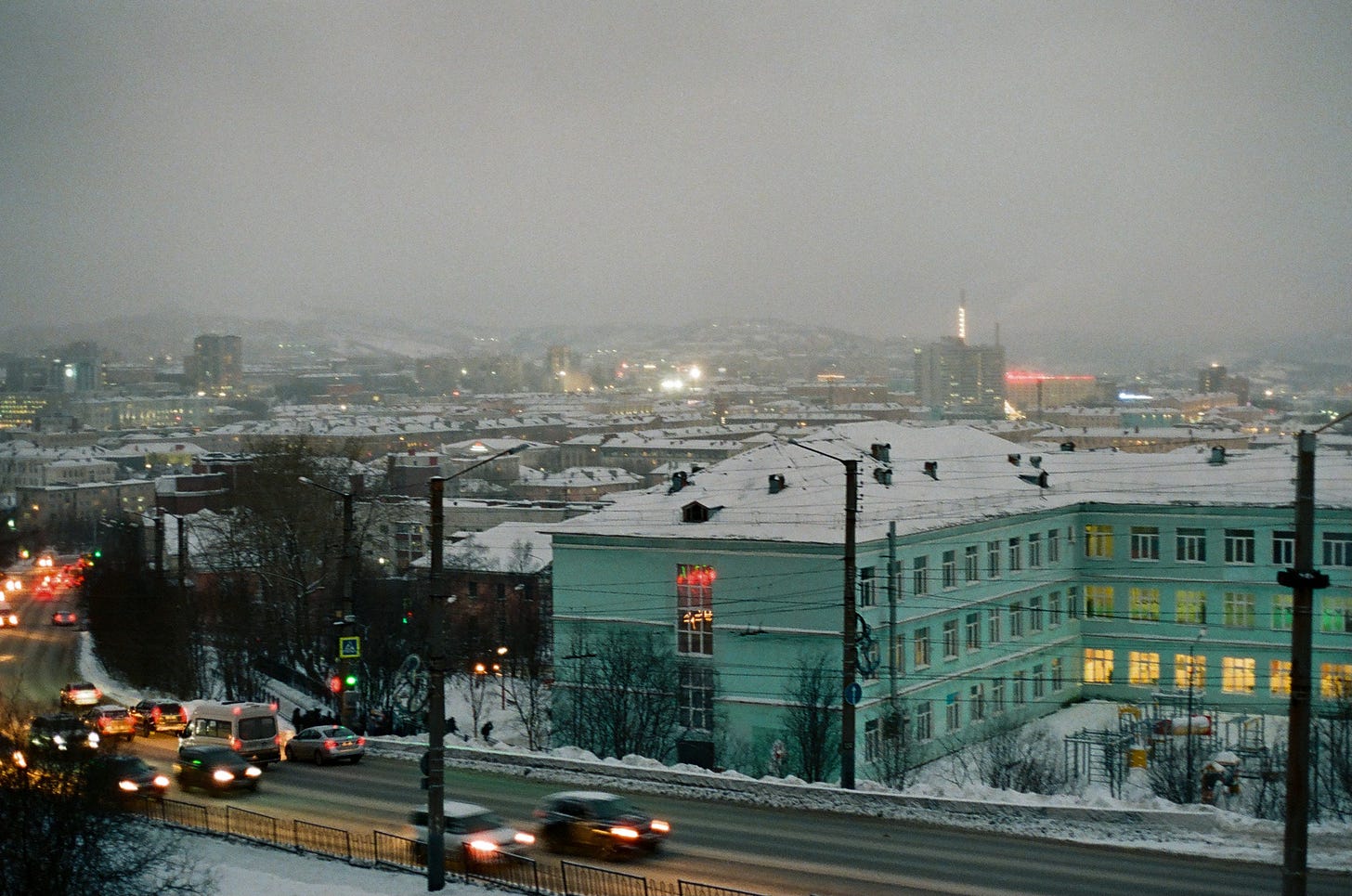


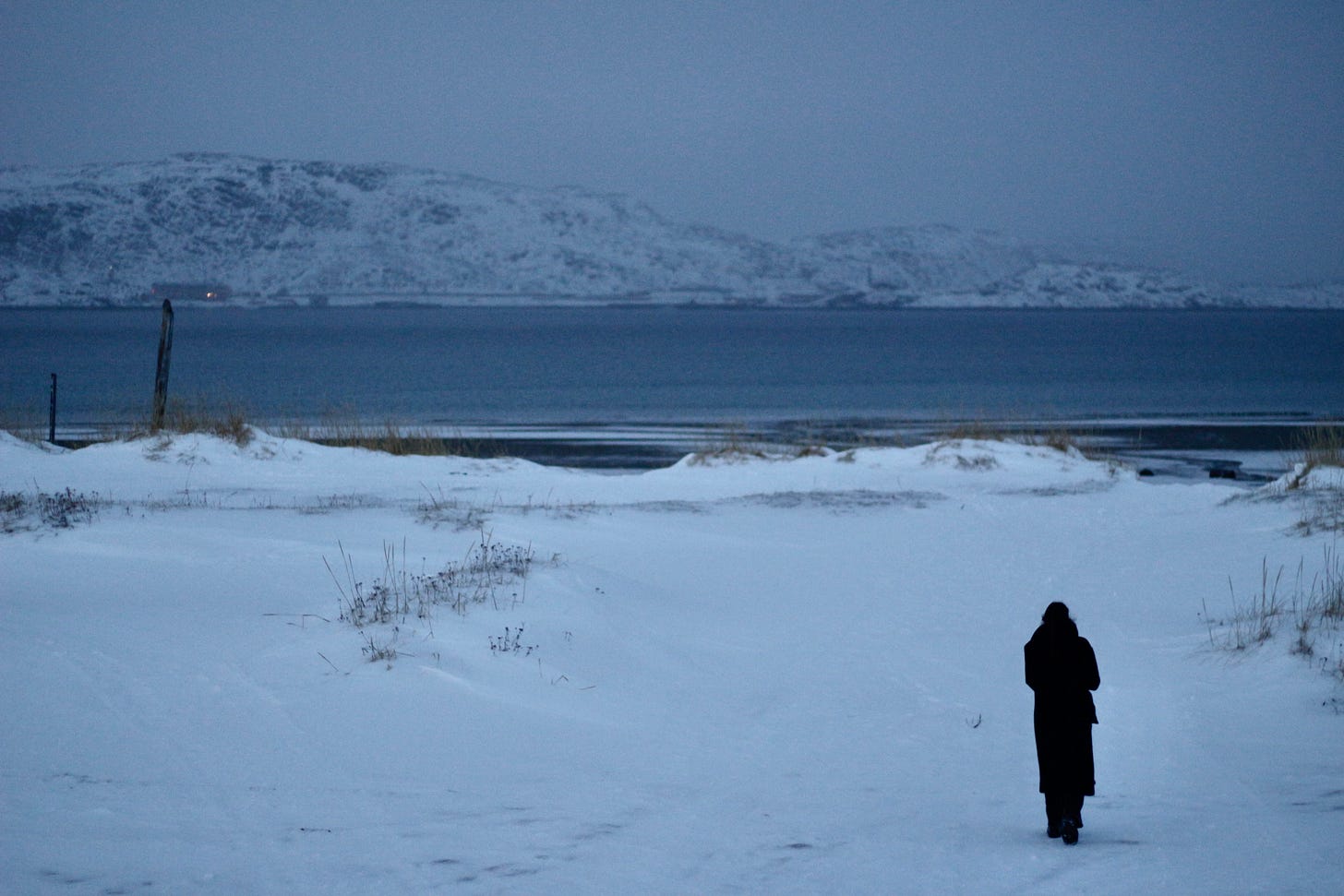
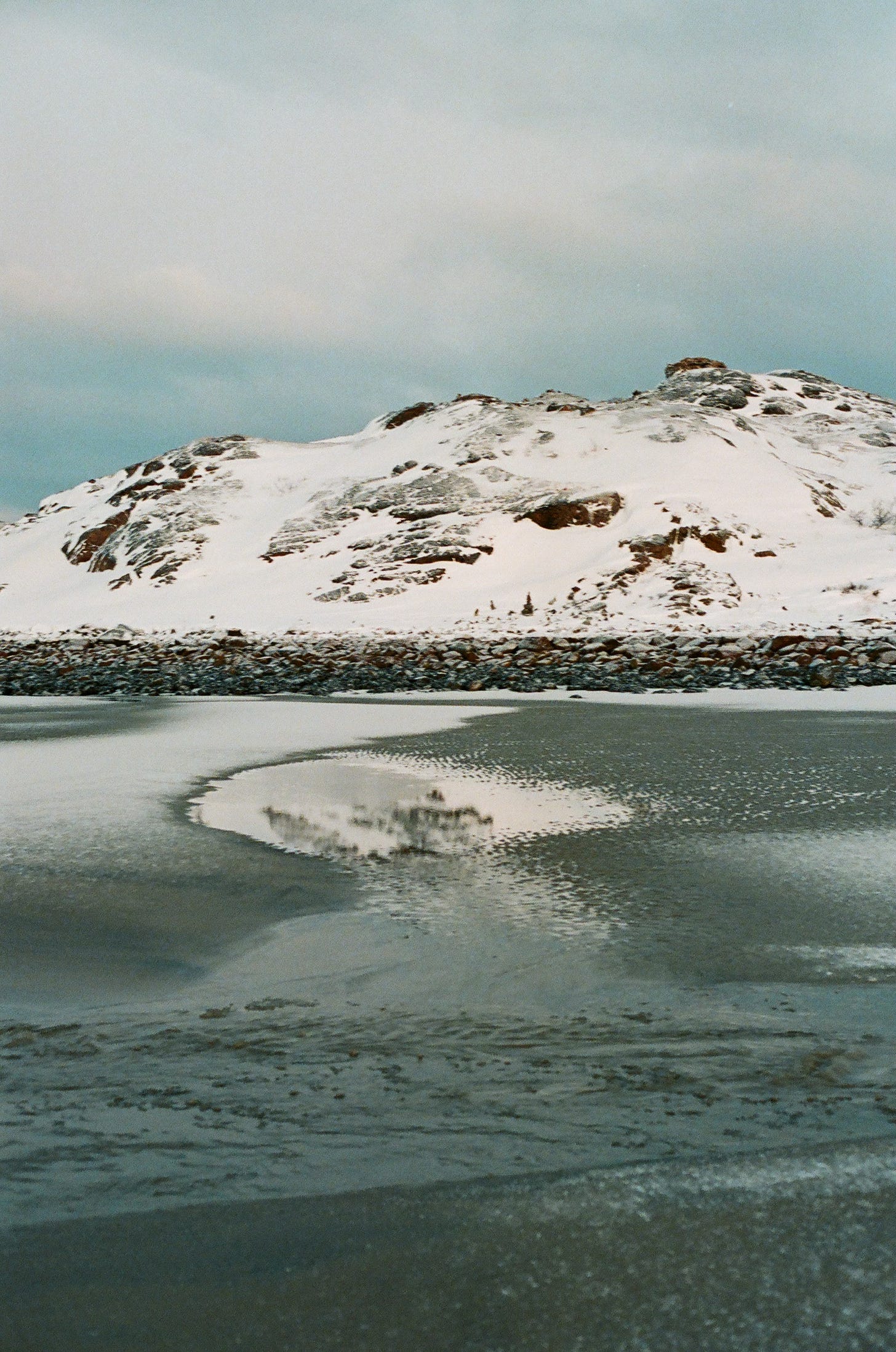

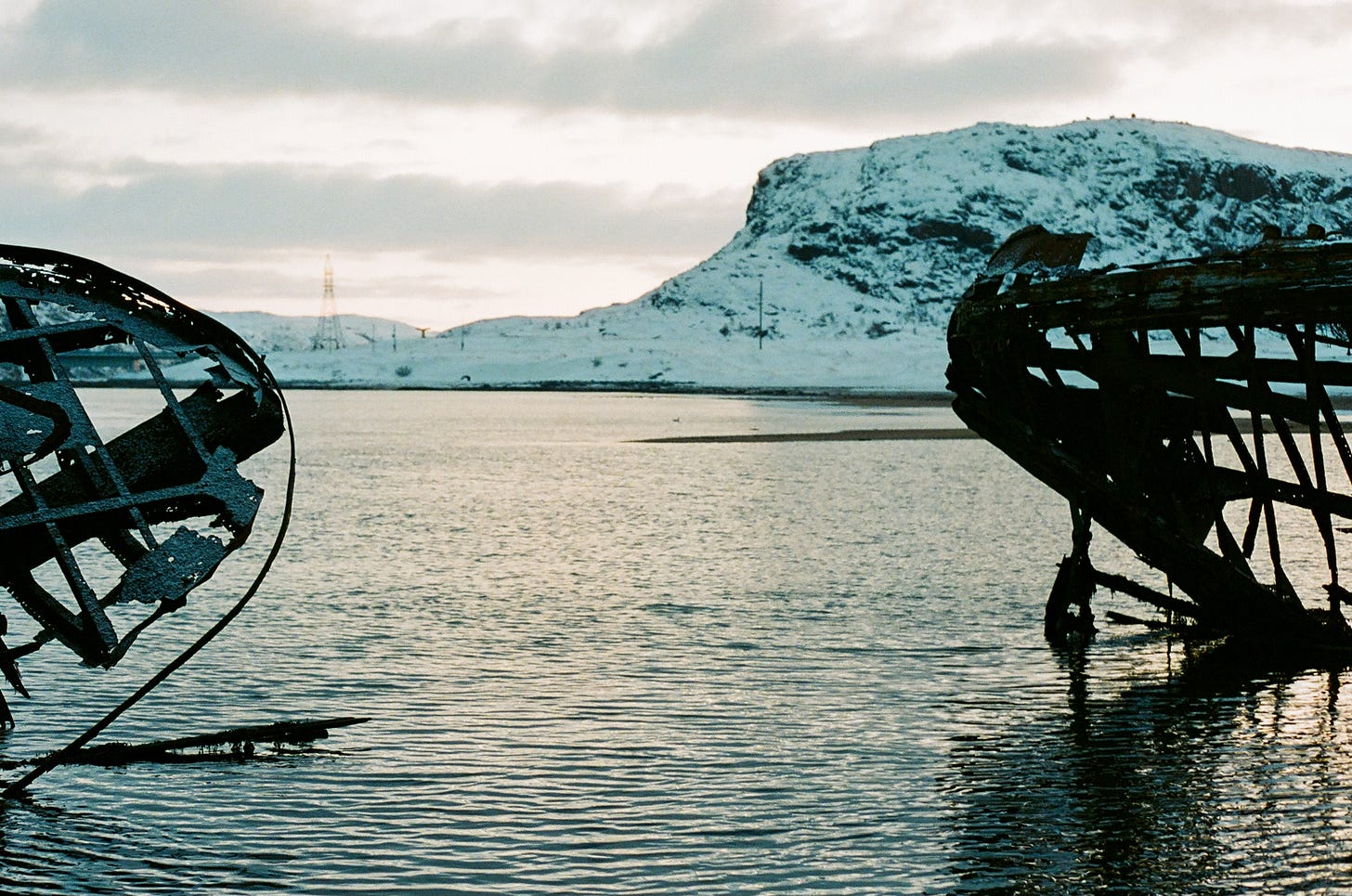
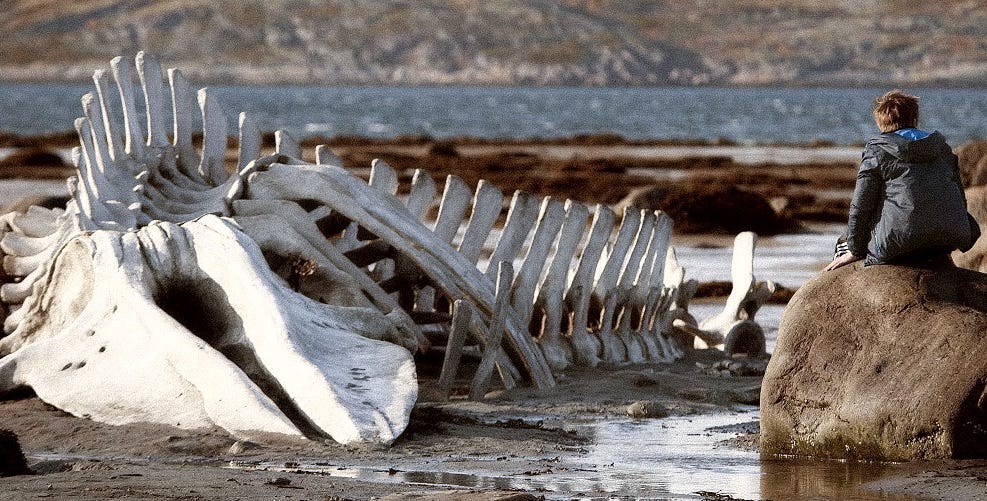
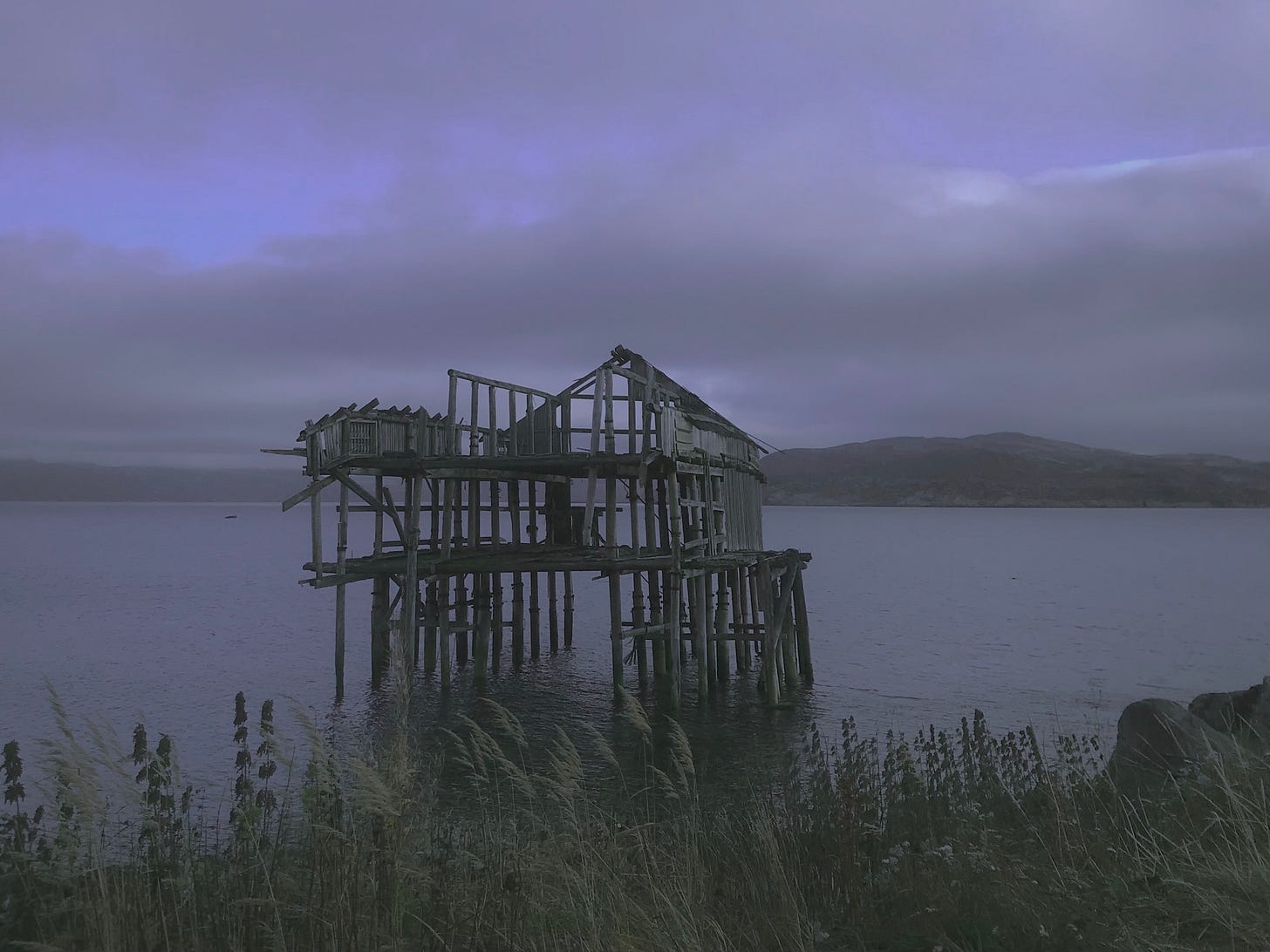


I feel like this really made something about you that I can never quite grasp more tangible, please more more more
i consumed this quickly and hungrily 🤍 i would someday love to go to russia with you and see it through your eyes